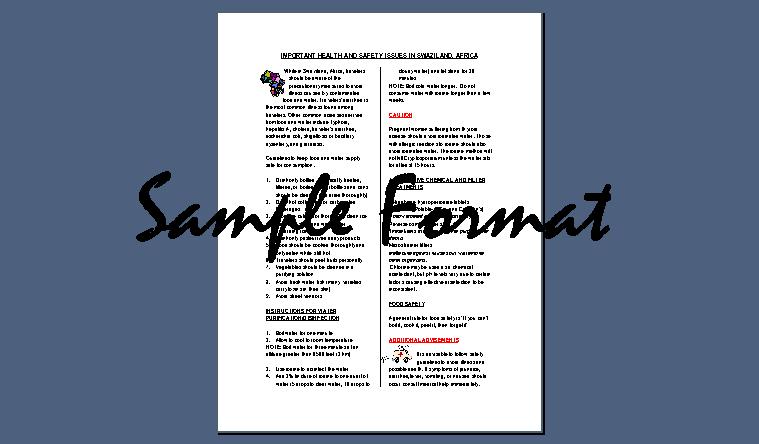|
While in Swaziland, Africa, travelers should be aware of the precautionary measures to avoid illness caused by contaminated food and water. Travelers diarrhea is the most common illness found among travelers. Other common diseases derived from food and water include typhoid, hepatitis A, cholera, travelers diarrhea, escherichia coli, shigellosis or bacillary dysentery, and giardiasis.
Guidelines to keep food and water supply safe for consumption:
1. Drink only bottled, chemically treated, filtered, or boiled water (bottles and cans should be cleaned and dried thoroughly)
2. Drink hot coffee, tea or carbonated beverages
3. Avoid ice cubes (or thoroughly clean ice trays with soap and water after discarding ice cubes)
4. Drink only pasteurized dairy products
5. Food should be cooked thoroughly and only eaten while still hot
6. Travelers should peel fruits personally
7. Vegetables should be cleaned in a purifying solution
8. Avoid fresh water fish (many varieties carry toxins in their skin)
9. Avoid street vendors
INSTRUCTIONS FOR WATER PURIFICATION/DISINFECTION
1. Boil water for one minute
2. Allow to cool to room temperature
NOTE: Boil water for three minutes at an altitude greater than 6500 feet (2 km)
3. Use iodine to disinfect the water
4. Add 2% tincture of iodine to one quart of water (5 drops to clear water, 10 drops to cloudy water) and let stand for 30 minutes
NOTE: Boil cold water longer. Do not consume water with iodine longer than a few weeks.
CAUTION
Pregnant women suffering from thyroid disease should avoid iodinated water. Those with allergic reactions to iodine should also avoid iodinated water. The iodine method will not kill Cryptosporidium unless the water sits for at least 15 hours.
ALTERNATIVE CHEMICAL AND FILTER TREATMENTS
Tetraglycine hydroperiodide tablets (Globaline, Potable-Aqua, and Coghlans)
Follow labeled instructions carefully.
Reverse osmosis filters
These filters are often become plugged with debris
Microstrainer filters
Ineffective against viruses but will remove other organisms.
Chlorine may be used as a chemical disinfectant, but pH levels vary due to certain factors causing effective disinfection to be inconsistent.
FOOD SAFETY
A general rule for food safety is If you cant boil it, cook it, peel it, then forget it
ADDITIONAL ADVISEMENTS
It is advisable to follow safety guidelines to avoid illness and possible death. If symptoms of jaundice, diarrhea, fever, vomiting, or nausea should occur consult medical help immediately.
|

